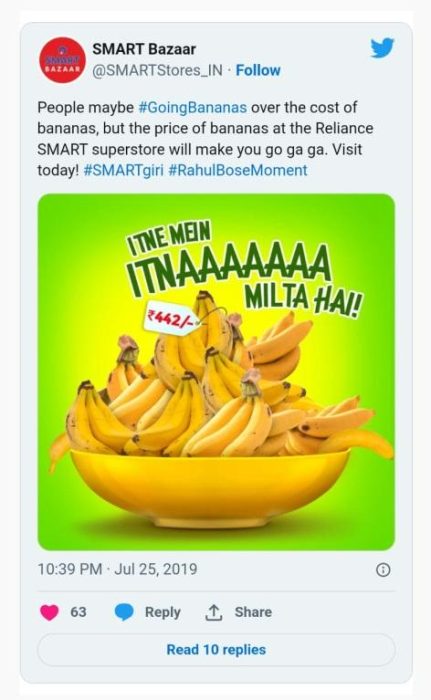Blog
# HASHTAGS AND TRADEMARKS & their co-relation
On 22nd July, 2019, Rahul bose, an Indian actor, shared a bill on twitter where a luxury hotel charged him Rs 442.50 for two bananas and the Indian corporates started #goingbananas and formulated their advertisement strategies around it and soon #RahulBoseMoment started trending:-




Hashtags are everywhere on Twitter, Instagram, Facebook, YouTube etc. and knowing how to use hashtags can significantly help to engage with people and to grab their instant attention, which increase content reach, amplify brand awareness, help target specific markets and many more. Thus, the use of hashtags has become increasingly popular as a tool for businesses and individuals to promote their brands on social media platforms.
Hashtags and Trademarks and Trademarks and Hashtags both may seem mutually exhaustive concepts but both are the powerful tools which can be used as source identifier and to bring brand awareness. However, the use of a hashtag may infringe on the trademark rights of another person.
Like trademarks, Hashtags may include word, letter, numeral or any combination thereof preceded by the # symbol having no space in between. Though, what can be a trademark is much a wider concept comparatively. The Trademarks Act, 1999, does not specifically mention the use of hashtags. However, the Act defines a trademark as any mark capable of being represented graphically and which is capable of distinguishing the goods or services of one person from those of others. This definition is broad enough to cover hashtags, and courts in India have recognized hashtags as a form of trademark. Therefore, a hashtag can be registered and protected as a trademark as well.
However, it is important to note that not all hashtags may be eligible for trademark protection. The hashtag to be registered as trademark must be in compliance with sections 9 and 11 of The Trademarks Act, 1999. Hashtags that are generic or descriptive of the goods or services may not be registerable as trademarks. Additionally, the hashtag must be distinctive and not likely to be confused with existing trademarks or used in a way that would be detrimental to the reputation of another trademark owner. Moreover, It should not be a emblem and/or name, use of which is prohibited under the Emblems and Names (Prevention of Improper Use) Act, 1950 and further, it should not contains or comprises scandalous or obscene matter and any matter likely to hurt the religious susceptibilities of any class or section of the citizens of India.
The owner of a registered trademark has the exclusive right to use the trademark and any unauthorized use of the trademark by another person amounts to trademark infringement. The owner of a registered trademark can initiate legal action against any person who infringes on the trademark. Therefore, if a hashtag includes a registered trademark, the user may be infringing on the trademark if they use it without permission from the owner.
In the case of Taj Television Limited v. Rajan Mandal & Ors. (2017), the Delhi High Court held that the use of a hashtag containing a registered trademark could constitute trademark infringement. In this case, the defendants had used the hashtag #SonyMax while promoting their channel, which was similar to the registered trademark of the plaintiff, Taj Television Limited. The court observed that the use of the hashtag had the effect of confusing and misleading the public, and therefore constituted trademark infringement.
Similarly, in the case of Curewell Drugs & Pharmaceuticals v. Ridley Life Science Pvt. Ltd. (2020), the Bombay High Court held that the use of the hashtag #curacovid by the defendant amounted to trademark infringement. The plaintiff, Curewell Drugs & Pharmaceuticals, had registered the trademark Cura for its pharmaceutical products. The court observed that the use of the hashtag containing the registered trademark of the plaintiff was a clear case of trademark infringement.
Conclusion :
In conclusion, both the hashtags and trademarks are correlated concepts though at many different levels, they have distinct aspects but both are the powerful tools which prominently can be used for brand recognition, promotion and advertisement. The Trademarks Act, 1999, defines a trademark broadly enough to cover hashtags, and courts in India have recognized hashtags as a form of trademark therefore, hashtags can also be registered and protected as trademarks. Likewise, a Trademark infringement case can also be initiated against a use of hashtag if it includes a registered trademark and use of it is without the permission. Businesses and individuals should be careful when using hashtags on social media and should ensure that they are not infringing on any trademarks. The case law cited above illustrates the importance of taking precautions to avoid trademark infringement when using hashtags on social media platforms.

This Post Has 4 Comments
I have been browsing online more than three hours today yet I never found any interesting article like yours It is pretty worth enough for me In my view if all website owners and bloggers made good content as you did the internet will be a lot more useful than ever before
I have been surfing online more than 3 hours today yet I never found any interesting article like yours It is pretty worth enough for me In my opinion if all web owners and bloggers made good content as you did the web will be much more useful than ever before
obviously like your website but you need to test the spelling on quite a few of your posts Several of them are rife with spelling problems and I to find it very troublesome to inform the reality on the other hand Ill certainly come back again
Nice blog here Also your site loads up fast What host are you using Can I get your affiliate link to your host I wish my web site loaded up as quickly as yours lol